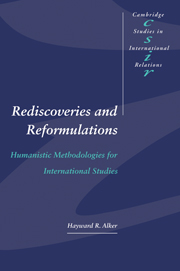Book contents
- Frontmatter
- Contents
- List of figures
- List of tables
- Acknowledgments
- Introduction: Voyages of rediscovery
- Part I Recovering Western antiquity
- Part II The humanistic science of the modern classics
- Part III Contemporary humanistic reformulations
- 8 Fairy tales, tragedies and world histories: Testable structuralist interpretations
- 9 Beneath Tit-for-Tat: The contest of political economy fairy tales within SPD protocols
- 10 Emancipatory empiricism: Toward the renewal of empirical peace research
- 11 The presumption of anarchy in world politics: On recovering the historicity of world society
- 12 The return of practical reason to international theory
- References
- Index
- CAMBRIDGE STUDIES IN INTERNATIONAL RELATIONS
12 - The return of practical reason to international theory
Published online by Cambridge University Press: 13 January 2010
- Frontmatter
- Contents
- List of figures
- List of tables
- Acknowledgments
- Introduction: Voyages of rediscovery
- Part I Recovering Western antiquity
- Part II The humanistic science of the modern classics
- Part III Contemporary humanistic reformulations
- 8 Fairy tales, tragedies and world histories: Testable structuralist interpretations
- 9 Beneath Tit-for-Tat: The contest of political economy fairy tales within SPD protocols
- 10 Emancipatory empiricism: Toward the renewal of empirical peace research
- 11 The presumption of anarchy in world politics: On recovering the historicity of world society
- 12 The return of practical reason to international theory
- References
- Index
- CAMBRIDGE STUDIES IN INTERNATIONAL RELATIONS
Summary
Twenty-five years after Hedley Bull and Morton Kaplan debated in the pages of World Politics the relative merits of “scientific” and “classical” (or “traditional”) approaches to the study of international relations, the nearly simultaneous appearance of Kratochwil (1989), Onuf (1989), Hollis and Smith (1991), each of them a philosophically self-aware effort to redefine the discipline of international relations, allows a reconsideration of some of the key issues involved. Because Hollis and Smith rely heavily for their philosophical framework on Hollis' earlier text in the philosophy of social science, The Cunning of Reason (Hollis 1987), and that book also clarifies the connections between Hollis and Smith, and Kratochwil and Onuf, I have included it too in this review.
Contrary to earlier, self-flattering, largely North American “scientific” scholarly self-assessments, the evidence of these four mature works of international relations scholarship supports the interpretation that neither side has yet decisively won the debate. Rather, it now appears that all the mentioned authors have made considerable, interdisciplinary progress in combining both classical and contemporary social scientific theorizing modalities to address the key judgmental issues that Bull emphasized as central to the classical approach.
They have done so, I wish to show, by following the lead of post-Wittgensteinian philosophy in resurrecting, with reformulations and against considerable intellectual resistance, the Aristotelian notion of “practical reason.” They deploy their renewed sense of practical activity for a variety of purposes, including the productive reframing of realists' “perennial” problem of anarchic order.
- Type
- Chapter
- Information
- Rediscoveries and ReformulationsHumanistic Methodologies for International Studies, pp. 394 - 421Publisher: Cambridge University PressPrint publication year: 1996



